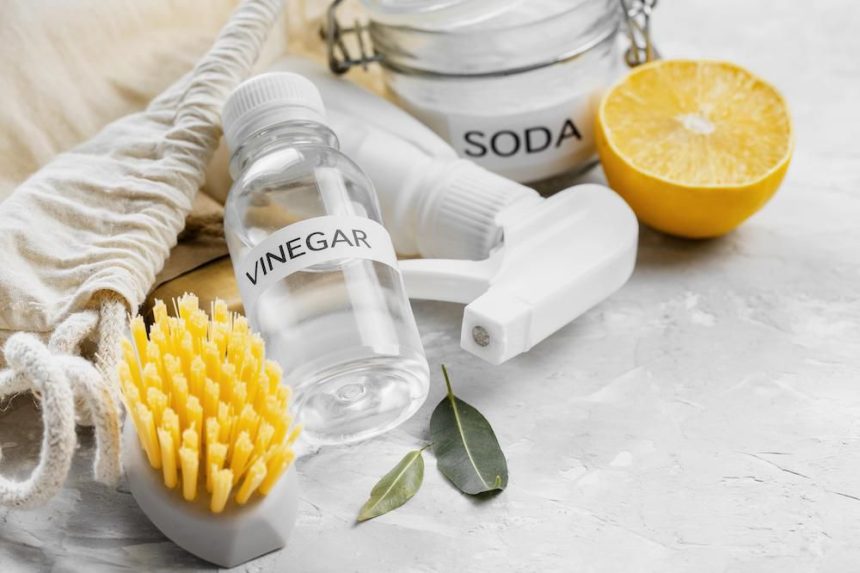Distilled white vinegar can do everything from brighten your laundry to disinfect your bathroom. While the natural product is undeniably versatile, cleaning with vinegar can actually damage certain surfaces and materials because of its high acetic acid composition. To keep you and your belongings safe, it’s important to know when not to use vinegar for household cleaning.
Vinegar Explained
A popular household ingredient, vinegar is fermented in a two-step process and is a combination of acetic acid and water, says Marla Mock, president of Molly Maid. “Different types of vinegar are used in cooking and baking, with distilled white vinegar most often used in cleaning,” she says.
Petra Olteanu/Getty Images
Why Vinegar Is Used for Cleaning
While vinegar serves multiple purposes, it is often used for household cleaning because it is effective at removing stains, deodorizing, and removing grime from surfaces. “It is well-known that the acetic acid in vinegar has antimicrobial properties, which can help kill certain types of bacteria and germs, making it an effective natural disinfectant,” says Alicia Sokolowski, the president and co-CEO of AspenClean. “Vinegar can also help neutralize and eliminate odors.”
Cleaning Vinegar vs. White Vinegar
While both are made primarily from acetic acid and water, distilled white vinegar and cleaning vinegar have key differences. “The acidity levels are the primary difference between these two products,” says Sokolowski. “Cleaning vinegar usually has a higher concentration of acetic acid compared to regular white vinegar.” White vinegar contains about 5 to 7 percent acetic acid, while cleaning vinegar has a higher concentration of around 6 to 8 percent.
Cleaning vinegar also sometimes has additional additives or chemicals that enhance its cleaning powers and eliminate specific odors. “Regular white vinegar generally maintains its natural scent and doesn’t include extra additives for fragrance or enhanced cleaning,” says Sokolowski.
When to Avoid Vinegar for Cleaning
Despite how effective it is, there are some cases where distilled white vinegar isn’t suitable for cleaning.
Anything With Chlorine Bleach
Never use vinegar to clean anything with bleach. “Mixing chlorine bleach (sodium hypochlorite) with vinegar (acetic acid) is not recommended, at all, due to the potential chemical reaction that can occur, leading to the release of harmful gases called chlorine gas,” says Sokolowski. “When these two substances are combined, it can cause various health issues, especially when inhaled in high concentrations.”
Natural Stone
If your countertops or shower are made of natural stone—marble, granite, limestone, or travertine—you may risk damaging them when cleaning with vinegar. “White vinegar, which contains acetic acid, can etch and damage these surfaces due to its acidic nature,” says Sokolowski. “Using vinegar on natural stone can cause dullness, pitting, or loss of shine in the stone surface.”
Grout
Avoid using vinegar on grout that is damaged or unsealed, which can cause it to deteriorate due to the product’s high acidity, says Mock. However, vinegar can be use to clean grout that is sealed and is an effective way to remove stains. Before using vinegar on sealed grout, test a small patch to ensure it doesn’t cause any damage or discoloration, says Sokolowski.
Unfinished Wood
Unfinished wood is more porous than finished or sealed wood, meaning white vinegar can penetrate the wood fibers and cause it to smell or warp, says Sokolowski. “White vinegar can also alter the wood’s natural appearance and make it look uneven or blotchy,” she says.
Cast Iron
Just as you should avoid cooking acidic foods on cast iron, you should also avoid cleaning it with acidic products like vinegar. “Cast iron pans are often seasoned with a layer of polymerized oil that provides a natural non-stick surface and protects the pan from rust,” says Sokolowski. “Vinegar is acidic and can potentially strip away this seasoning, leading to a loss of the pan’s non-stick properties and exposing the iron to potential rusting.”
Electronics
You shouldn’t use vinegar to clean electronics for several reasons. “Electronics are highly sensitive to moisture,” says Sokolowski. “Applying white vinegar directly to electronic devices can introduce moisture into areas where it shouldn’t be, potentially causing damage to internal components or leading to short circuits.” Additionally, it can corrode or damage certain electronic components and even cause discoloration.
Rubber
Do not use vinegar on anything rubber. “Like natural stone surfaces and grout, vinegar’s acidic properties can eat away at rubber,” says Mock. Instead, clean rubber with a combination of natural soap and water.
Pet Messes
Although white vinegar is often used for neutralizing odors and disinfecting, it can leave a residual smell that some pets may be sensitive to. “The lingering vinegar scent may discourage them from using the designated areas, or they might find the smell unpleasant,” says Sokolowski.
Waxed Furniture
Don’t use white vinegar on waxed furniture, as it can dull the finish, says Mock. Additionally, the acid in white vinegar can cause the wax to break down and dissolve on the furniture.








